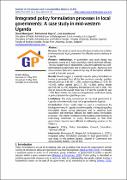Integrated policy formulation processes in local governments: A case study in mid-western Uganda

View/
Date
2021Author
Mwesigwa, David
Bogere, Mohammed
Anastassova, Lina
Metadata
Show full item recordAbstract
Purpose: This study set out to assess the level of policy formulation in Hoima district local government for effective service delivery in Uganda.
Research methodology: A quantitative case study design was embraced, aiming at 30 local councillors and 60 technical officials. The real sample was 54 respondents. Data were gathered via a self-administered questionnaire and an interview guide. Numerical and non-numerical data were examined by way of descriptive statistics as well as thematic analysis.
Results: Results suggest a moderate mean for policy formulation in Hoima as generated from all the five constructs namely; problem identification (μ=2.88; SD= 1.346), problem manifesto (μ=2.76; SD =1.347), policy agenda (μ=2.17; SD =1.268), policy debate (μ=2.58; SD =1.271) and policy decision (μ=2.20; SD =1.268). This was so because the overall mean was 2.52 and the overall SD was 1.300. Nevertheless, the numerous impediments confronted mainly at policy decision disrupted the process.
Limitations: The study concentrated on one local government in Uganda and so the results may not be generalised to Uganda.
Contribution: These results might be used as contributions for local governments in Uganda to evolve a guide on integrating policy formulation issues during orientation and or retooling local councillors and technical officials for better policy formulation processes. This article contributes to the budding understanding by underlining undertones in policy formulation so that local governments become more efficient in delivering services to the citizenry.
Collections
- Research Articles [139]
